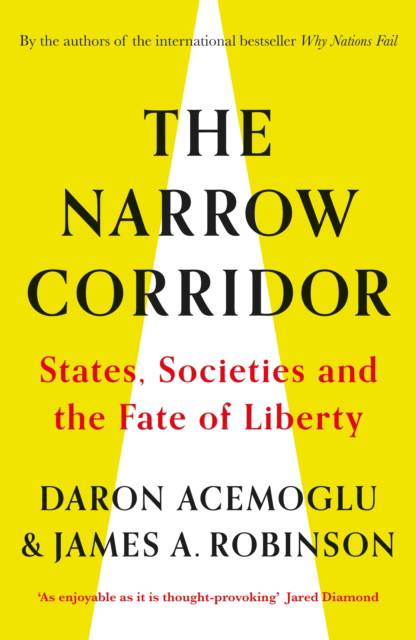
- Retrait gratuit dans votre magasin Club
- 7.000.000 titres dans notre catalogue
- Payer en toute sécurité
- Toujours un magasin près de chez vous
- Retrait gratuit dans votre magasin Club
- 7.000.0000 titres dans notre catalogue
- Payer en toute sécurité
- Toujours un magasin près de chez vous
The Narrow Corridor
States, Societies and the Fate of Liberty
Daron Acemoglu, James A. Robinson
Livre relié | Anglais
34,95 €
+ 69 points
Format
Description
By the authors of the international bestseller Why Nations Fail, based on decades of research, this powerful new big-picture framework explains how some countries develop towards and provide liberty while others fall to despotism or anarchy - and explains how liberty can thrive.
Liberty is hardly the 'natural' order of things; usually states have been either too weak to protect individuals or too strong for people to protect themselves from despotism. There is also a happy Western myth that where freedom exists, it's a steady state, arrived at by 'enlightenment'. But this static view is a fantasy, the authors argue; rather, the corridor to liberty is narrow and stays open only through a self-reinforcing struggle between state and society - between elites and citizens. Liberty depends on a delicate balance between the two.
This struggle - which affects peace and prosperity - is incessant, and its outcome not predetermined. As the authors show, contrary to some theories, there is no inevitability to how countries move in and out of the corridor; Europe's political and economic ascendancy, for example, was not guaranteed. Particular historical relationships in each country between state and society affect their political and economic trajectory, and therefore influence how countries respond to events and shocks. So the future is up for grabs.
With compelling stories from around the world, in history and from today - and with a single framework through which the path of any nation can be understood - this masterpiece helps us in the vital task of understanding the past and present, and analysing the future. For today the road to freedom is becoming more treacherous, endangering the peace and prosperity that depend on it - and the opposite of the narrow corridor to liberty is the road to ruin.
Liberty is hardly the 'natural' order of things; usually states have been either too weak to protect individuals or too strong for people to protect themselves from despotism. There is also a happy Western myth that where freedom exists, it's a steady state, arrived at by 'enlightenment'. But this static view is a fantasy, the authors argue; rather, the corridor to liberty is narrow and stays open only through a self-reinforcing struggle between state and society - between elites and citizens. Liberty depends on a delicate balance between the two.
This struggle - which affects peace and prosperity - is incessant, and its outcome not predetermined. As the authors show, contrary to some theories, there is no inevitability to how countries move in and out of the corridor; Europe's political and economic ascendancy, for example, was not guaranteed. Particular historical relationships in each country between state and society affect their political and economic trajectory, and therefore influence how countries respond to events and shocks. So the future is up for grabs.
With compelling stories from around the world, in history and from today - and with a single framework through which the path of any nation can be understood - this masterpiece helps us in the vital task of understanding the past and present, and analysing the future. For today the road to freedom is becoming more treacherous, endangering the peace and prosperity that depend on it - and the opposite of the narrow corridor to liberty is the road to ruin.
Spécifications
Parties prenantes
- Auteur(s) :
- Editeur:
Contenu
- Nombre de pages :
- 560
- Langue:
- Anglais
Caractéristiques
- EAN:
- 9780241314296
- Date de parution :
- 30-09-19
- Format:
- Livre relié
- Dimensions :
- 162 mm x 240 mm
- Poids :
- 800 g

Les avis
Nous publions uniquement les avis qui respectent les conditions requises. Consultez nos conditions pour les avis.






